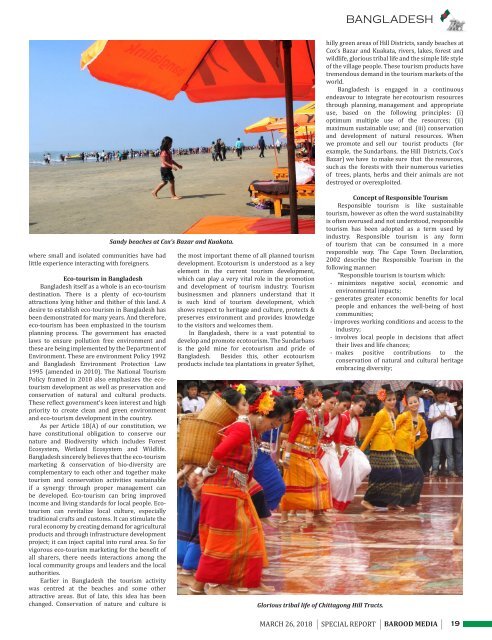Bangladesh Supplement 2018
Country Profile - Bangladesh by Barood Media
Country Profile - Bangladesh by Barood Media
Create successful ePaper yourself
Turn your PDF publications into a flip-book with our unique Google optimized e-Paper software.
BANGLADESH<br />
where small and isolated communities have had<br />
little experience interacting with foreigners.<br />
Eco-tourism in <strong>Bangladesh</strong><br />
<strong>Bangladesh</strong> itself as a whole is an eco-tourism<br />
destination. There is a plenty of eco-tourism<br />
attractions lying hither and thither of this land. A<br />
desire to establish eco-tourism in <strong>Bangladesh</strong> has<br />
been demonstrated for many years. And therefore,<br />
eco-tourism has been emphasized in the tourism<br />
planning process. The government has enacted<br />
laws to ensure pollution free environment and<br />
these are being implemented by the Department of<br />
Environment. These are environment Policy 1992<br />
and <strong>Bangladesh</strong> Environment Protection Law<br />
1995 (amended in 2010). The National Tourism<br />
Policy framed in 2010 also emphasizes the ecotourism<br />
development as well as preservation and<br />
conservation of natural and cultural products.<br />
These reflect government’s keen interest and high<br />
priority to create clean and green environment<br />
and eco-tourism development in the country.<br />
As per Article 18(A) of our constitution, we<br />
have constitutional obligation to conserve our<br />
nature and Biodiversity which includes Forest<br />
Ecosystem, Wetland Ecosystem and Wildlife.<br />
<strong>Bangladesh</strong> sincerely believes that the eco-tourism<br />
marketing & conservation of bio-diversity are<br />
complementary to each other and together make<br />
tourism and conservation activities sustainable<br />
if a synergy through proper management can<br />
be developed. Eco-tourism can bring improved<br />
income and living standards for local people. Ecotourism<br />
can revitalize local culture, especially<br />
traditional crafts and customs. It can stimulate the<br />
rural economy by creating demand for agricultural<br />
products and through infrastructure development<br />
project; it can inject capital into rural area. So for<br />
vigorous eco-tourism marketing for the benefit of<br />
all sharers, there needs interactions among the<br />
local community groups and leaders and the local<br />
authorities.<br />
Earlier in <strong>Bangladesh</strong> the tourism activity<br />
was centred at the beaches and some other<br />
attractive areas. But of late, this idea has been<br />
changed. Conservation of nature and culture is<br />
Sandy beaches at Cox’s Bazar and Kuakata.<br />
the most important theme of all planned tourism<br />
development. Ecotourism is understood as a key<br />
element in the current tourism development,<br />
which can play a very vital role in the promotion<br />
and development of tourism industry. Tourism<br />
businessmen and planners understand that it<br />
is such kind of tourism development, which<br />
shows respect to heritage and culture, protects &<br />
preserves environment and provides knowledge<br />
to the visitors and welcomes them.<br />
In <strong>Bangladesh</strong>, there is a vast potential to<br />
develop and promote ecotourism. The Sundarbans<br />
is the gold mine for ecotourism and pride of<br />
<strong>Bangladesh</strong>. Besides this, other ecotourism<br />
products include tea plantations in greater Sylhet,<br />
Glorious tribal life of Chittagong Hill Tracts.<br />
hilly green areas of Hill Districts, sandy beaches at<br />
Cox’s Bazar and Kuakata, rivers, lakes, forest and<br />
wildlife, glorious tribal life and the simple life style<br />
of the village people. These tourism products have<br />
tremendous demand in the tourism markets of the<br />
world.<br />
<strong>Bangladesh</strong> is engaged in a continuous<br />
endeavour to integrate her ecotourism resources<br />
through planning, management and appropriate<br />
use, based on the following principles: (i)<br />
optimum multiple use of the resources; (ii)<br />
maximum sustainable use; and (iii) conservation<br />
and development of natural resources. When<br />
we promote and sell our tourist products (for<br />
example, the Sundarbans, the Hill Districts, Cox’s<br />
Bazar) we have to make sure that the resources,<br />
such as the forests with their numerous varieties<br />
of trees, plants, herbs and their animals are not<br />
destroyed or overexploited.<br />
Concept of Responsible Tourism<br />
Responsible tourism is like sustainable<br />
tourism, however as often the word sustainability<br />
is often overused and not understood, responsible<br />
tourism has been adopted as a term used by<br />
industry. Responsible tourism is any form<br />
of tourism that can be consumed in a more<br />
responsible way. The Cape Town Declaration,<br />
2002 describe the Responsible Tourism in the<br />
following manner:<br />
“Responsible tourism is tourism which:<br />
- minimizes negative social, economic and<br />
environmental impacts;<br />
- generates greater economic benefits for local<br />
people and enhances the well-being of host<br />
communities;<br />
- improves working conditions and access to the<br />
industry;<br />
- involves local people in decisions that affect<br />
their lives and life chances;<br />
- makes positive contributions to the<br />
conservation of natural and cultural heritage<br />
embracing diversity;<br />
MARCH 26, <strong>2018</strong> SPECIAL REPORT BAROOD MEDIA 19







